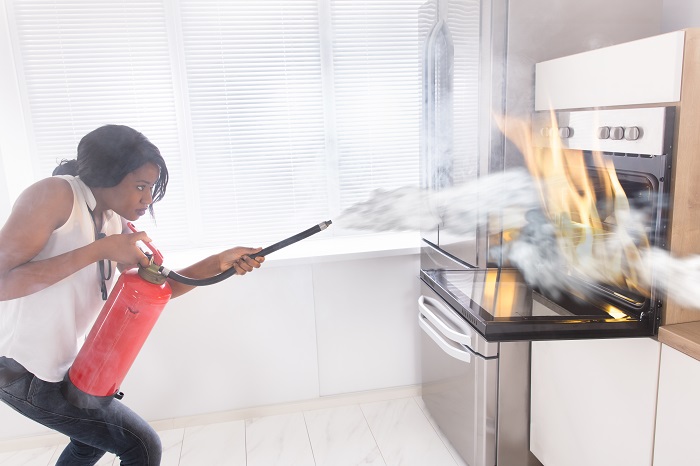
We pledge to provide straight talk from our NNINS Virginia insurance experts. Read the Northern Neck Insurance Integrity Promise.
Between 2017 and 2021 fire departments responded to over 158,000 home structure fires that started in the kitchen and led to roughly 470 civilian deaths. Cooking is inherently the most dangerous activity at home, so it’s critical that you know how to prevent kitchen fires, put them out safely, and that your family has the proper insurance so if the worst-case scenario happens, your home and property are protected.
How to Prevent Kitchen Fires & Protect Your Home
The best way to prevent fire damage is to prevent the fire from starting in the first place. Below are a few tips to avoid this disaster:
-
- Keep cooking equipment clean and ensure burners don’t build up residue.
- Never leave the stove unattended while cooking. If you cook on the stovetop, you should not leave the room until your cooking process is complete. If you have to leave the room, turn off all burners.
- If you have a wood stove, learn how to maintain your wood stove properly.
- Turn the burner off immediately if grease starts to boil or smoke is produced.
- Be particularly careful with fast, high-heat cooking, including using a wok.
- Turn the pot handles to the back of the stove so you don’t bump into them while moving around the kitchen. This can also prevent burning or scalding injuries.
- Do not put combustible materials, such as pot holders, on the stove. Put food packaging in the trash or back in the fridge right away.
- Don't wear loose clothing while cooking. Wear short or close-fitting sleeves.
- Never put hot grease in the garbage, and never pour grease or oil down the drain.
- Avoid cooking while tired, intoxicated, sick, or under the influence of medication that can cause slow reflexes or drowsiness.
- Promptly clean up spills of flour, sugar, pudding mix, or any other fine powder with a vacuum. Fine dust is highly flammable and can even explode.
- Learn how to fireproof your entire house during the winter months.
How to Safely Stop an Oven or Kitchen Fire
Consider storing a Class B fire extinguisher in the kitchen since these are typically designed for kitchen fires.
If the fire originated in the oven or microwave, keep the door to these appliances closed. The fire should quickly exhaust the available oxygen and go out, hopefully only damaging the appliance. Never open the oven door if you see actual flames. If possible, turn off the oven and double-check that the burners are off. Unplug any nearby appliances and move everything away, especially combustible items. Get the fire extinguisher ready, but if you’re in doubt, evacuate and call the fire department.
For stovetop fires, it's essential to know what kind of fire you’re dealing with.
Non-Oil Fires
Non-oil fires typically happen when something flammable, such as food packaging or a dish towel, comes into contact with a burner. The easiest way to put out these fires is to pick up the smoldering item with tongs, drop it in the sink, and run water over it. Turn everything off until the fire is thoroughly extinguished. If you don't have tongs or anything else suitable, turn the oven off and use a fire extinguisher.
Oil Fires
Most kitchen fires are oil or grease fires. Never, ever pour water on a grease fire! This can create an explosive fireball and is the most common cause of non-fatal injuries during kitchen fires. When cooking, keep the pan's lid or a baking sheet handy. If the pan catches fire, slide the lid or sheet over it, turn the burner off, and wait at least twenty minutes.
You can also use a Class B fire extinguisher or baking soda, but ensure you have a lot of it. Don’t try to smother a grease fire with flour. That's another great way to cause an explosion!
Protect Your Home With Personalized Insurance
If the worst-case scenario happens and a kitchen fire damages your home, ensure you are covered by homeowners insurance. With personalized home insurance, you can pay for the coverage you need and protect your assets during a disaster.
Fire Insurance Coverage in Virginia
At Northern Neck Insurance Company, we offer local homeowners insurance that covers kitchen fires. Reach out to one of our independent insurance agents or request a quote today!
THE NORTHERN NECK INSURANCE INTEGRITY PROMISE — We pledge to provide straight talk and good counsel from our NNINS Virginia insurance experts through our blog. While we hope you find this to be a helpful source of information, it does not replace the guidance of a licensed insurance professional, nor does it modify the terms of your Northern Neck Insurance policy in any way. All insurance products are governed by the terms in the applicable insurance policy.


